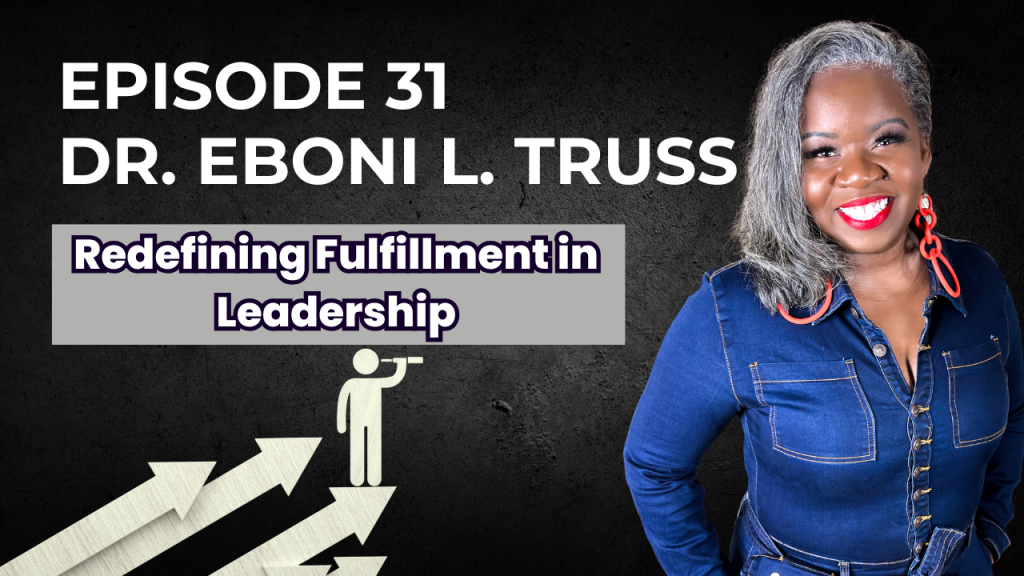Leadership fulfillment has become an increasingly relevant concept in organizational research, particularly as many high achievers experience diminishing returns from performance-based success. Traditional notions of leadership focus on external achievements such as promotions, titles, and profits, yet growing evidence suggests that sustainable leadership effectiveness depends on psychological fulfillment and authentic purpose. The integration of purpose-driven leadership with positive psychology provides a holistic approach to leader well-being, emphasizing meaning and engagement over output metrics.
Dr. Eboni L. Truss, founder of The Unbecoming Movement and guest on DissedMedia’s A Startup Story, articulates this shift vividly. In the interview, she describes how accomplished professionals often follow external “success scripts” written by coaches, mentors, and corporate culture until they become, in her words, “a shadow of their own purpose.” Her argument—that performance without authenticity leads to inner dissonance, resonates with emerging research in leadership psychology. Dr. Truss calls this process of rediscovering inner alignment unbecoming: a deliberate unlearning of external expectations to reconnect with intrinsic motivation and purpose.
This synthesis explores how leadership fulfillment operates as both a psychological construct and an organizational principle. Drawing from the frameworks of positive psychology, authenticity theory, and organizational behavior, it examines how purpose-driven leadership can enhance leader well-being while maintaining high performance. The discussion integrates Dr. Truss’s experiential insights with contemporary scholarship that links leader flourishing to sustainable organizational outcomes.

Defining Leadership Fulfillment
Leadership fulfillment refers to a sustained sense of purpose, alignment, and satisfaction that arises when a leader’s actions reflect their internal values and long-term goals. It contrasts with transient satisfaction derived from external achievements. In the context of purpose-driven leadership, fulfillment is conceptualized as a dynamic equilibrium between professional performance and personal meaning.
Dr. Truss’s account illustrates this equilibrium: after years of following market expectations, she realized that her work no longer reflected her authentic purpose. She emphasizes that leaders often lose fulfillment not from failure but from over-performance, from consistently meeting goals that do not align with their identity. This insight parallels self-determination theory, which argues that psychological health depends on the satisfaction of autonomy, competence, and relatedness needs (Deci & Ryan, 2008).
Positive psychology provides the theoretical foundation for understanding why leaders like Dr. Truss experience renewed vitality when they align their work with personal meaning. Seligman’s PERMA model identifies five key pillars of well-being; positive emotion, engagement, relationships, meaning, and accomplishment (Seligman, 2011). When leaders operate from fulfillment rather than compliance, these dimensions reinforce each other: meaningful engagement fosters positive emotion, which in turn strengthens relationships and performance.
Recent research expands on the PERMA model through the PERMA+4 framework, which adds physical health, mindset, environment, and economic security as determinants of flourishing (Donaldson, Llewellyn van Zyl, & Donaldson, 2022). These additions underscore Dr. Truss’s view that fulfillment is internal and structural; requiring workplaces that value authenticity and reflection as much as productivity.
From Performance to Purpose
High-achieving leaders are often socialized into performance paradigms that emphasize measurable outputs and short-term achievements. However, scholars have documented that performance-oriented motivation can undermine intrinsic satisfaction and lead to burnout (Ryan & Deci, 2000). When success is narrowly defined by external metrics, leaders may experience what Sheldon and Kasser (1998) call “false self” functioning, wherein personal authenticity and psychological needs are suppressed to maintain appearances of success.
Purpose-driven leadership offers a corrective to this imbalance. It reorients leader motivation toward intrinsic values and societal contribution. In this model, success is evaluated not solely by results but by alignment with enduring purpose and stakeholder impact. Research in self-determination theory supports this approach, suggesting that autonomy and meaning are primary drivers of motivation and well-being (Deci & Ryan, 2008).
Dr. Truss echoes this transition from output to meaning. She describes fulfillment as a “reconnection with what originally called you to lead,” suggesting that effective leadership begins where performance metrics leave off. Her emphasis on reflection and intentionality parallels empirical findings that self-awareness and purpose alignment enhance long-term engagement and resilience.
The shift from performance to purpose, therefore, represents more than a motivational adjustment; it is a recalibration of what leadership success entails. Leaders who integrate purpose-driven principles into their professional identities demonstrate higher levels of psychological coherence and satisfaction, hallmarks of leadership fulfillment.

Positive Psychology and Leader Well-Being
Positive psychology extends traditional organizational research by focusing on human flourishing rather than deficit correction. Within leadership contexts, this orientation reframes effectiveness as a function of well-being rather than exhaustion or sacrifice. The PERMA model provides a comprehensive framework for assessing leader well-being across multiple domains (Seligman, 2011).
Empirical studies confirm the utility of this model for understanding leader outcomes. A recent analysis of PERMA well-being and innovative work behavior found that positive emotion, engagement, and meaning predicted creativity and proactive performance (Ibrahim, Mohd Noor, & Fadzil, 2023). Similarly, Donaldson et al. (2022) demonstrated that PERMA+4 dimensions are predictive of both individual flourishing and organizational performance.
Leader well-being, in this sense, functions as both a predictor and product of leadership fulfillment. Purpose-driven leadership provides the behavioral and ethical framework that enables positive psychological states to manifest in work contexts. Leaders who cultivate meaning and relational authenticity report greater engagement and reduced emotional exhaustion (Bono et al., 2013).
These findings suggest that leadership fulfillment is not merely an outcome of psychological resilience but an ongoing process of aligning positive psychological constructs with leadership behavior. This integrative model positions well-being as a strategic variable in leadership research and practice.
Authenticity as a Foundation of Leadership Fulfillment
Authenticity has long been recognized as a critical dimension of effective leadership. Kernis and Goldman (2006) define authenticity as the unobstructed operation of one’s true self in daily life, encompassing self-awareness, unbiased self-processing, behavior congruent with values, and relational openness. Authentic leaders derive credibility and trust by acting in ways that align with their inner principles rather than external expectations.
In the context of leadership fulfillment, authenticity operates as both a mechanism and a marker. Leaders cannot experience fulfillment if their actions are incongruent with their identity or moral beliefs. When authenticity is compromised, leaders may achieve external success but feel internally fragmented.
Empirical studies support the positive relationship between authentic leadership and well-being. Guenter, Biemann, & Herzog (2017) found that authenticity mediates the relationship between leader self-concept and psychological health. This demonstrates that self-aligned leadership reduces stress and promotes engagement. It also reinforces that leadership fulfillment depends on the integration of authenticity within organizational culture and personal development.
Systems and Environments Supporting Fulfillment
Leadership fulfillment does not occur in isolation. Organizational systems, culture, and job design shape the conditions under which leaders experience meaning and well-being. Research in job design theory emphasizes that autonomy and feedback are essential for motivation and satisfaction (Hackman & Oldham, 1976). When organizations encourage distributed leadership and self-determination, leaders are more likely to find fulfillment in their roles.
The PERMA+4 model reinforces this perspective by identifying environmental and physical health factors as predictors of flourishing (Donaldson et al., 2022). For instance, supportive cultures that prioritize collaboration and transparency facilitate authenticity and engagement. Conversely, cultures focused exclusively on metrics and competition inhibit purpose-driven behavior.
Organizations that integrate well-being into their leadership frameworks not only enhance individual fulfillment but also foster sustainable performance. Empirical evidence links leader well-being to team engagement and organizational citizenship behaviors, illustrating a ripple effect across hierarchical levels (Bakker & Demerouti, 2017). Therefore, leadership fulfillment should be considered a strategic asset rather than a personal luxury.
Integrating Purpose-Driven Leadership and Positive Psychology
Purpose-driven leadership and positive psychology converge in their focus on human potential and intrinsic motivation. Both paradigms advocate for environments that support meaning, connection, and accomplishment. Integration of this framework operationalizes leadership fulfillment within organizational settings.
Positive psychology offers measurement tools such as the PERMA Profiler (Butler & Kern, 2016) that can quantify well-being dimensions relevant to leadership development programs. Purpose-driven leadership provides the behavioral counterpart—articulating how leaders can enact purpose through vision, ethics, and service. Together, these approaches promote sustainable leadership models grounded in evidence-based well-being science.
From an academic perspective, future research should examine causal pathways between purpose-driven behaviors and psychological constructs such as engagement, resilience, and authenticity. Longitudinal studies would clarify whether leadership fulfillment predicts sustained performance or if the relationship is reciprocal.

Practical Applications for Organizations
Organizations seeking to foster leadership fulfillment can implement several empirically supported practices:
- Purpose Articulation Frameworks: Encourage leaders to define and communicate personal and organizational purpose statements that align with shared values.
- Well-Being Metrics: Incorporate leader well-being indicators into performance reviews using models such as PERMA or PERMA+4 (Donaldson et al., 2022).
- Authenticity Development Programs: Include reflective exercises, value assessments, and coaching that promote self-awareness and behavioral alignment (Kernis & Goldman, 2006).
- Positive Psychology Interventions: Integrate gratitude exercises, mindfulness programs, and strengths-based feedback systems shown to improve engagement and meaning (Seligman, 2011).
- Systemic Culture Change: Build organizational cultures that reward collaboration, learning, and ethical behavior rather than only financial output (Bakker & Demerouti, 2017).
When implemented cohesively, these strategies establish a culture that supports both performance and fulfillment, aligning organizational success with human well-being.
Toward a Theory of Fulfillment
Leadership fulfillment synthesizes purpose-driven leadership, authenticity, and positive psychology. It positions well-being as both an ethical imperative and a performance strategy. Future theoretical development should treat fulfillment as a multidimensional construct encompassing cognitive, emotional, behavioral, and systemic factors.
Dr. Truss’s articulation of “unbecoming” can be seen as a metaphor for realignment, a process of removing performative layers that obscure purpose. Her work highlights how leaders can translate evidence-based insights from positive psychology into reflective practice.
In essence, leadership fulfillment redefines successful leadership as the integration of purpose, authenticity, and well-being into everyday practice. When these elements are embedded within organizational culture, leaders become both effective and personally grounded, demonstrating how human strengths can drive lasting organizational excellence.



































